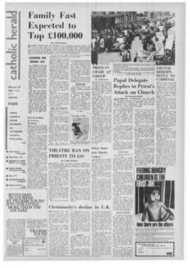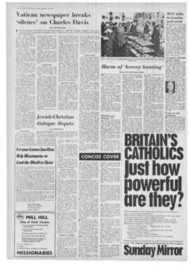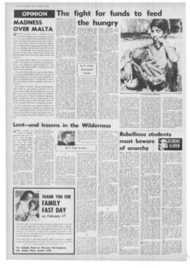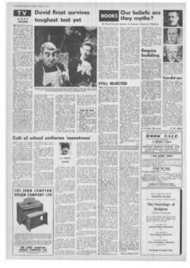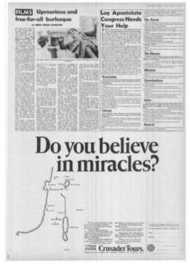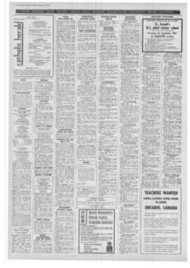Page 4, 10th February 1967
Page 4
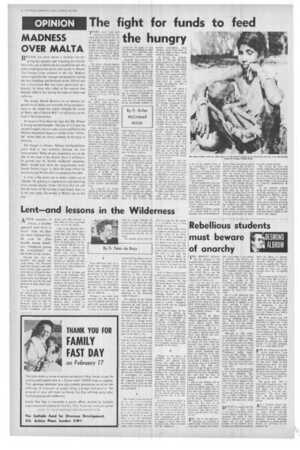
Report an error
Noticed an error on this page?If you've noticed an error in this article please click here to report it.
Tags
Share
Related articles
Church's Stormy Days
St. John Baptist, June 25
Starting Lent Among The Animals
Scripture Notebook Michael Barnes Sj
Scripture Notebook
Lent and lessons in the Wilderness
By Fr. Peter de Rosa
AFTER centuries of silence, a prophet appeared once more in Israel : John the Baptist. Jesus followed him. 1-le took his place humbly among sinners, was "numbered among the transgressors", on the banks of the Jordan.
Through that river the 4sraelites had passed centuries before. The Promised Land was journey's end after their Exodus, their passover from slavery in Egypt to freedom. There in Canaan they consolidated and brought to fruition the new life they had nurtured in their desert wanderings.
In the fast-flowing river of the Jordan Jesus insisted on being baptized by John. He went down into it, was buried in it and came out onto the Promised Land. It was as though he wanted to identify himself completely with his people and their „history; to bear their sin away and bury it for ever in the waters.
"This is my beloved Son." afterwards said his Father's voice from the cloud. These words. in the context of the gospels. are reminiscent of those of Isaiah about the Servant of God, "Behold my servant, whom I uphold, my chosen in whom my soul de lights" (Tsai. 42: I). While Jesus prayed the Spirit anointed him in power for his mission as Messiah and then drove him into the desert. For Jesus it was a time of personal crisis and decision.
He fasted for 40 days and nights in the wilderness. This was a kind of painful sacrament of Israel's 40 years' wandering in the desert. When he was weakest he was tempted; tempted to choose glory and earthly renown; tempted to change stones into bread so that his contemporaries would think of him as a great and glorious king: tempted to work wonders in order to impress an incredulous and earthly-minded multitude.
Jesus will have none of it. Israel had sometimes failed but he will not fail. In the desert, under the guidance and promptings of the Spirit, he faces up to the vocation his Father has given him as the representative of Israel. and. through Israel, of all mankind. He will redeem not from suffering as the Jews expected but by suffering.
Perhaps it was when Jesus returned from the desert, at once triumphant and yet haggard with exposure and fasting, that John pointed him out to some of the future apostles with the words. "Behold the Lamb of God". Yes, this was Isaiah's Servant in whom there is no beauty or comeliness, the Lamb who is to be slaughtered in atonement for the sins of many.
The apostles would have re membered that picture of Jesus when some three years afterwards they saw him being baptized for a second time. "I have a baptism with which I must he baptized," said Jesus referring to his a t on i n g death on the cross. On that cross he bore the sin of the world. the sin which was only washed away when he went through the waters of death and passed over. alive and immortal. to the Promised Land of heaven.
The baptism in the Jordan was not simply Christ's way of summing up, and taking on himself the whole of Israel's history. It was, in addition, a kind of symbolic rehearsal of his baptism of death. This was the final Exodus when not servitude to a foreign power but sin and death themselves were finally left behind in the enveloping waters. From then onwards, Jesus was fully Lord and Christ (Acts 2:39).
In Lent. God's people walk together into the wilderness to fast and pray and to battle with temptation. Already one with Jesus, "the Lord and the Christ", and sharing his risen life, they still journey in this world; they are still in a state of exile. Not here the bricks and mortar of an abiding city. This is why God's people must share with Jesus, in however small a way, his role of Suffering Servant. Suffering of itself is meaningless. It assumes meaning only in so far as it is the conquest, gradual it may be, of life (God's life) over the mundane forces of sin, dissolution and death.
The Church in her liturgy is at this time but consecrating the Christian struggle with sin which is an ever-present element in our earthly existence. It is folly and self-delusion to suggest that there is no such thing as sin. All experience testifies to its terrifying reality. Our religion acknowledges this reality and witnesses that it is only overcome by the power of a sacrificial love. a love triumphing on a cross.
Dead and risen with Christ at baptism, transfigured in our inmost reality by the Lord. warmed by the friendship of the Spirit dwelling in us, we still need to live out our baptism piecemeal every day. The way into the Promised Land is never a path strewn with roses. We may be fed with the manna of Christ's body, we may be illumined and led by Christ the Light of the World, but ahead of us there lies the long journey in a desolate land.
Lent, in these present years, must also mean for the Church as a whole a meditation on her God-given vocation. We said that in the desert Jesus himself, under the Spirit's impulse, began to fathom better the part he was to play of the Suffering Servant. He was jolted out of the quiet, industrious, peaceful atmosphere of home to preach a Kingdom which would only be realized in his own death.
The Church today. for her part, has left behind the Nazareth of old. The Spirit of the Council has descended on her and, in some sense, unsettled her. A public ministry of almost impossible dimensions awaits her at present faltering steps. This is why, like Christ her Master, she must prepare herself by a desolating experience in the wilderness. Only in this way will she, too, combine fidelity to the past with complete openness to the demands of the future.
History is the place of ambiguity and decision. Whether the Church will emerge with credit from her contemporary hesitations and struggles, whether she will accept the cross and the agony, whether she will resolve the ambiguity of today's situation with the faith that "overcomes". we do not know. What we do know is that the many purifying and generous sacrifices of all her members. of the sick and the poor especially, will be the chief means whereby the Church becomes what God intends her to be this Lent.
The Church in the midst of trials takes comfort in this: at the heart of our Christian faith i, the conviction that life is not simply the reward but the ripe fruit of death. It was the One who experienced the ultimate abandonment of God who redeemed the world. And he began to know what this meant one day when he walked into the wilderness.
blog comments powered by Disqus


